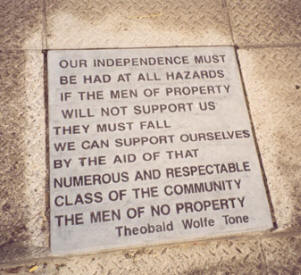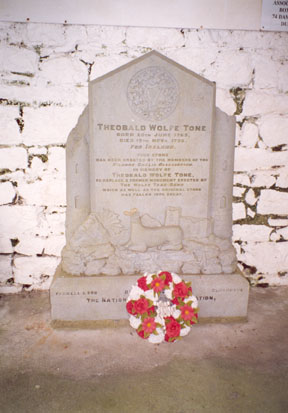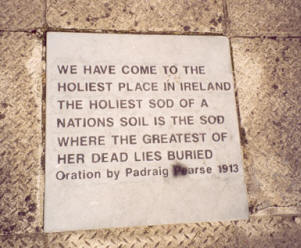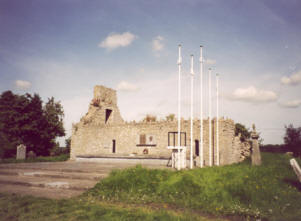
Wolfe Tone |
|||
| Theobald Wolfe Tone, the father of Irish Republicanism, was born in Dublin in 1763 in comfortable circumstances. As a member of the privileged Anglo-Irish ascendancy he attended Trinity College Dublin and trained as a lawyer, but soon turned his attention to politics. In the age of The French Revolution he was one of the co-founders of the United Irishmen in 1791, which aimed at reforming the very unjust divisions then practised and encouraged by Britain. The Society aimed for civil, political and religious liberties and politics, which included all citizens, not just the privileged Anglo-Irish class, which was propped up by London. The United Irishmen were suppressed in 1794 and subsequently continued as a secret revolutionary organisation. |
 |
||
|
|||
British troops, supplemented by foreign mercenaries, were able to suppress regional risings brutally one after the other. A small French invasion force arrived too late, after the rebels had been defeated at Vinegar Hill, and after initial successes, was overwhelmed. When Tone himself landed in Lough Swilly with the main French expedition, they were arrested. Theobald Wolfe Tone was tried for treason in Dublin. He stated: |
 |
"From my earliest youth I have regarded the connection between Ireland and Great Britain as the curse of the Irish nation, and felt convinced, that while it lasted, this country would never be free or happy. In consequence, I determined to apply all the powers which my individual efforts could move, in order to separate the two countries. That Ireland was not able, of herself, to throw off the yoke, I knew. I therefore sought for aid wherever it was to be found… Under the flag of the French Republic I originally engaged with a view to save and liberate my own country. For that purpose I have encountered the chances of war amongst strangers: for that purpose I have repeatedly braved the terrors of the ocean, covered as I knew it to be with the triumphant fleets of that Power which it was my glory and my duty to oppose. I have sacrificed all my views in life; I have courted poverty; I have left a beloved wife unprotected, and children which I adored, fatherless. After such sacrifices, in a cause which I have always considered as the cause of justice and freedom - it is no great effort at this day to add the sacrifice of my life." |
Sentenced to death, Tone in circumstances, which have remained unclear on 19 November 1798.
He was survived by Matilda Tone, his highly intelligent wife, who acted as guardian of his memory and writings, ensuring that they would survive for future generations.
 |
 |
Tones Grave
In Bodenstown churchyard there is a green grave,
And wildly around it the winter winds rave;
Smaller shelter I ween are the ruined walls there
When the storm sweeps down on the plains of Kildare.
Once I lay on that sid – it lies over Wolfe Tone –
And thought how he perished in prison alone,
His friends unavenged and his country unfreed –
“Oh, bitter,” I said, “tis the patriot’s meed”.
“For in him the heart of a woman combined
With heroic spirit and a governing mind –
A martyr for Ireland, his grave has no stone –
His name seldom named, and his virtues unknown.”
I was woke from my dream by the voices and tread
Of a band who came into the home of the dead;
They carried no cross, and they carried no stone,
And they stopped when they came to the grave of Wolfe Tone.
There were students and peasants, the wise and the brave,
And an old man who knew him from cradle to grave,
And children who thought me hard-hearted, for they
On that sanctified sod were forbidden to play.
But the old man, who saw I was mourning there, said:
“We come, sir, to weep where young Wolfe Tone is laid,
And we’re going to raise him a monument, too –
A plain one, yet fit for the loyal and true.”
My heart overflowed, and I clasped his old hand,
And I blessed him, and blessed every one of his band:
“Sweet, sweet ‘tis to find that such faith can remain
In the cause and the man so long vanquished and slain.”
In Bodenstown churchyard there is a green grave,
And freely around it let winter winds rave –
Far better they suit him – the ruin and gloom
‘Till Ireland, a nation, can build him a tomb.
Thomas Davis
